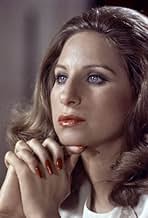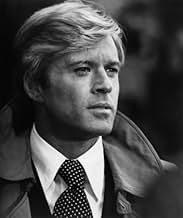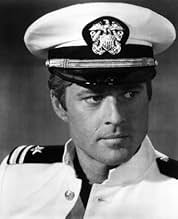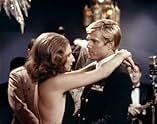IMDb RATING
7.0/10
29K
YOUR RATING
During post-WWII McCarthyism, a diametrically opposed couple come together only to find out that genuine friendship and physical attraction is not enough to overcome fundamental societal bel... Read allDuring post-WWII McCarthyism, a diametrically opposed couple come together only to find out that genuine friendship and physical attraction is not enough to overcome fundamental societal beliefs.During post-WWII McCarthyism, a diametrically opposed couple come together only to find out that genuine friendship and physical attraction is not enough to overcome fundamental societal beliefs.
- Won 2 Oscars
- 6 wins & 8 nominations total
Featured reviews
There are movies about love being made all of the time. After awhile, they all begin to look the same. However, once in awhile, one is made that truly stands out. THE WAY WE WERE is such a film. This film, mixing love and politics, finds two individuals (Barbra Streisand and Robert Redford) who meet in college, but years pass before a romance blooms. She is an political activist, he's bored by politics. She's stern and serious, he's easygoing and laid-back. Although they love each other deeply, their differences begin to tear them apart. As far as romantic tearjerkers go, they don't get much better than this. Both Striesand and Redford are perfectly cast and their characters are ones in which viewers will grow to love and care about. Many viewers will also appreciate the realistic ending. This is a beautiful film.
Oh, the way they used to make movies. Robert Redford and Babs. The ultimate star-crossed lovers, him a privileged golden boy for whom everything came too easy, but he knew it, and her a socialist politico who had to work harder for everything because she was plain, jewish, and poor.
Through Beekman Place, McCarthyism, Hollywood, World War II and the fact that they simply weren't cut out for each other, they tried until they couldn't try any more. Barbra is deep and intellectual, at least she wants to be, but ends up being the ultimate drama queen, "I'm not pretty enough for you, am I?" and "Nobody will ever love you like I do." Redford is aloof and chilly and beautiful and as shallow as a mud puddle.
BUT, if you can watch that last scene, "I can't Katie." "I know." and not open up the waterworks then pack up your DVD player and give it to the Goodwill, because movies are not for you.
Epic and anchored by the history of the century, The title, The Way We Were refers to all of us. It's how we once were when things mattered and we cared. Too often dismissed as a chick flick or a tear jerker, this is two of the best there ever were at their personal best.
Through Beekman Place, McCarthyism, Hollywood, World War II and the fact that they simply weren't cut out for each other, they tried until they couldn't try any more. Barbra is deep and intellectual, at least she wants to be, but ends up being the ultimate drama queen, "I'm not pretty enough for you, am I?" and "Nobody will ever love you like I do." Redford is aloof and chilly and beautiful and as shallow as a mud puddle.
BUT, if you can watch that last scene, "I can't Katie." "I know." and not open up the waterworks then pack up your DVD player and give it to the Goodwill, because movies are not for you.
Epic and anchored by the history of the century, The title, The Way We Were refers to all of us. It's how we once were when things mattered and we cared. Too often dismissed as a chick flick or a tear jerker, this is two of the best there ever were at their personal best.
Barbra Streisand and Robert Redford look wonderful in this great story of doomed love. Character development (or arc) is supposed to be one of the basic elements of a good screenplay; but the whole point of Sydney Pollack's 1973 movie is that neither Katie Moroski nor Hubbell Gardner changes. She remains the serious-minded Jewish left-wing activist, and he the easy-going, politically uncommitted WASP, they are when they first meet in college in 1937. Fascinated with each other precisely because they are such opposites, they have an affair, marry and have a baby; but their inability to compromise - or in his case to stop compromising - leads to break-up.
The main action spans the eventful decade from the Spanish Civil War and New Deal, through WWII, to the McCarthy era, by which time Katie and Hubbell have moved from New York to Hollywood, where he is a screenwriter. Though melodramatic and sketchy, the political dimension of the story should not be underestimated; this is one of the very rare American movies in which a communist is treated sympathetically. Presumably much of this side of the scenario stemmed from the personal experience of writer Arthur Laurents, who was the same age as his protagonists, and who had McCarthy-related problems.
Both stars are perfect for their roles; we can see what they see in each other; and we desperately want it to work for them, though we know it won't! Notable in support are Bradford Dillman, Lois Chiles, and James Woods. The theme song, emotionally delivered by Streisand as only she can, is beautiful, but the relevance of its nostalgic lyric to this clear-eyed movie is doubtful.
The main action spans the eventful decade from the Spanish Civil War and New Deal, through WWII, to the McCarthy era, by which time Katie and Hubbell have moved from New York to Hollywood, where he is a screenwriter. Though melodramatic and sketchy, the political dimension of the story should not be underestimated; this is one of the very rare American movies in which a communist is treated sympathetically. Presumably much of this side of the scenario stemmed from the personal experience of writer Arthur Laurents, who was the same age as his protagonists, and who had McCarthy-related problems.
Both stars are perfect for their roles; we can see what they see in each other; and we desperately want it to work for them, though we know it won't! Notable in support are Bradford Dillman, Lois Chiles, and James Woods. The theme song, emotionally delivered by Streisand as only she can, is beautiful, but the relevance of its nostalgic lyric to this clear-eyed movie is doubtful.
Actually, "The Way We Were" is both, and happily so. It's a classy romantic period drama about a 1940s wallflower in New York who blooms in love with her ex-jock boyfriend (an old acquaintance from their college days), and the movie overflows with star-power. None of today's celebrities have the kind of chemistry Barbra Streisand and Robert Redford bring to the screen, and Streisand in particular is so deeply into this character that the herky-jerky editing and breathless writing don't harm her or get in the way (the faults can easily be overlooked). When writer Redford adapts his novel into a screenplay and the couple marries and moves to Hollywood in the McCarthy-Blacklist era, her passion for politics gets them both in hot water; that's where this script hits a snag, with increasingly melodramatic plotting (Redford's affair with a former flame) and confusion in the character motivations (this primarily due to hasty, eleventh-hour editing). Still, it is a handsomely-produced movie with a great tearjerker ending and two fine stars who plow right through the nonsense and bumpy continuity. They transcend the make-believe surroundings, turning the picture into something really special, something to remember. ***1/2 from ****
I can remember seeing THE WAY WE WERE when I was in high school and being surprised by how much I had enjoyed it. Romances were never really my thing, but I had always enjoyed the work of Robert Redford, so I decided to give it a try. I was floored by the power and beauty of film! My initial reactions to the film were, once again, how natural and charismatic Redford is as the classic example of the college golden boy, who feels slightly trapped. After the credits began to roll, I knew right then that I had seen something special, something that would pass the test of time. I assume others felt the same way, the film went on to become an international blockbuster and the top grosser of the year.
Years later, I watched THE WAY WE WERE again. Now older, I had a new perspective on the film, and to be completely honest, I enjoyed it even more! While I still think Redford is great in this film, I discovered that it is actually Barbra Streisand who gives the better performance. As the political activist Katie, Streisand has one her best roles since Fanny Brice in the original FUNNY GIRL and she provides a show-stopping performance. She displays both strength and vulnerability, she is at once both scorned and innocent. Her's is one of the best performances of the 70's.
The final verdict: THE WAY WE WERE stands the test of time as one of the best films of it's kind. Watch this film for the most moving finale in film history, for the knock out performance from Streisand, for the long-lasting chemistry between Redford and Streisand, and for one of the most famous and touching love stories of this century.
Out of 10, I'd rate THE WAY WE WERE a solid 10!
Years later, I watched THE WAY WE WERE again. Now older, I had a new perspective on the film, and to be completely honest, I enjoyed it even more! While I still think Redford is great in this film, I discovered that it is actually Barbra Streisand who gives the better performance. As the political activist Katie, Streisand has one her best roles since Fanny Brice in the original FUNNY GIRL and she provides a show-stopping performance. She displays both strength and vulnerability, she is at once both scorned and innocent. Her's is one of the best performances of the 70's.
The final verdict: THE WAY WE WERE stands the test of time as one of the best films of it's kind. Watch this film for the most moving finale in film history, for the knock out performance from Streisand, for the long-lasting chemistry between Redford and Streisand, and for one of the most famous and touching love stories of this century.
Out of 10, I'd rate THE WAY WE WERE a solid 10!
Did you know
- TriviaFilmed amid the ongoing Watergate political scandal, Robert Redford initially wanted the film to focus on the blacklisting of actors and writers during the McCarthy era. He was unhappy with cuts made to the film following a preview. "I think we'd both have preferred a more political Dalton Trumbo-type script," Redford recalled, "but finally Sydney came down on the side of the love story. He said, 'This is first and foremost a love affair,' and we conceded that. We trusted his instincts, and he was right."
- GoofsWhen the radio announcer refers to the time of Franklin Roosevelt's death, he says it occurred at 5:45 in the morning. President Roosevelt died in the early afternoon.
- Quotes
Hubbell Gardner: People are more important than their principles.
Katie Morosky Gardner: People ARE their principles.
- ConnectionsFeatured in Film Extra: Sydney Pollock (1973)
- SoundtracksThe Way We Were
Composed by Marvin Hamlisch
Lyrics by Marilyn Bergman and Alan Bergman
Sung by Barbra Streisand before the opening credits and during the end credits.
Music played often in the score
Details
Box office
- Budget
- $5,000,000 (estimated)
- Gross US & Canada
- $45,000,000
- Gross worldwide
- $45,000,493
Contribute to this page
Suggest an edit or add missing content










































